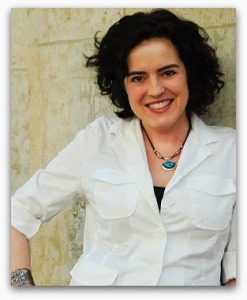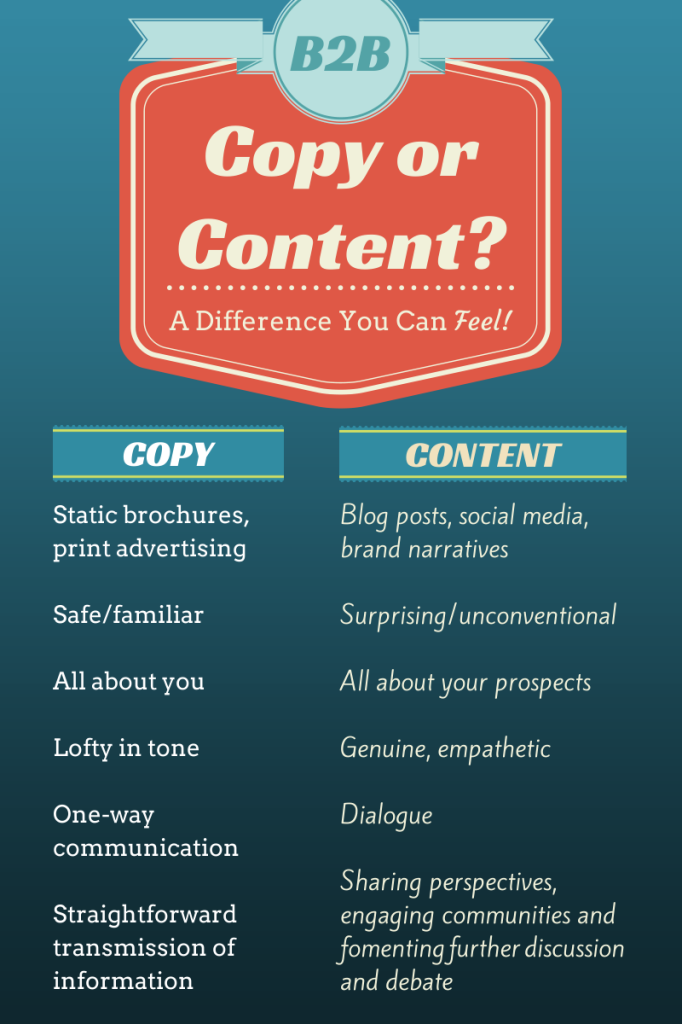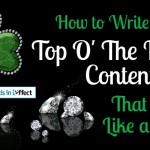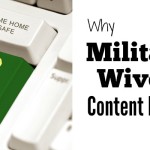By Becky Tumidolsky
For years, I called myself a copywriter.
I spent my days writing B2B copy—sales sheets, brochures, print ads, static web pages and the like. This was long before content appeared in the marketing lexicon and B2B marketers weren’t blogging or tweeting or any of it. In fact, Twitter, LinkedIn, Google+, Facebook—these were just a glint in someone’s eye.
I always enjoyed this kind of writing. Nothing could be more straightforward: a nice little company overview, smartly worded, with good flow and a professional tone. A wordsmith’s paradise.
What’s the company’s mission? What are its product or service offerings? Let’s add some punctuation (testimonials) and pizzazz (perhaps a colorful team picture and a few stock photos of handshakes and smiling couples).
Three folding panels of sheer beauty!
Have you ever felt this happy while reading a brochure? I’m guessing not.
I had only one tiny hang-up with writing this kind of copy. It often lacked, as Pink Floyd famously put it, “feelings—feelings of an almost human nature (this will not do).”
So you can imagine my delight when content marketing came into its own.
Copy Is Information. Content Is Human!
Today, I’m a content writer at heart and by trade. I’m writing in my own voice, reaching out to audiences in a spirit of empathy and camaraderie. I’m establishing relationships, building momentum, and making waves. It’s all very personal. And it’s a real joy.
The fact is, content writing has less to do with broadcasting self-perceived greatness than with meeting audiences on their turf and engaging them in an open, honest, two-way dialogue about what matters to them.
Content tells and copy sells. It’s as simple as that. – Elizabeth Campbell
Yes, “content tells” (a brand’s story, a brand’s heart) rather than “sells.” But for the benefit of B2B marketers who continue to make the mistake of stuffing their content with copy, I believe this notion could use some unpacking.
Here’s a tidy little graphic I made (courtesy of Canva) to summarize the difference between copy and content. It’s a pretty big divide, if you ask me.
A Distinction Without a Difference?
Do you see copywriting and content writing as fundamentally distinct practices? How should copy be deployed in support of content marketing campaigns? Please share your thoughts below.

Since 2001, Becky Tumidolsky has written awareness-building content for B2B brands and their discerning audiences. Her work has appeared in leading publications such as Forbes, U.S.News & World Report, Bloomberg Markets, Newsweek, and Inc. as well as corporate blogs, websites, white papers, and other content assets.
Becky loves writing fluid, error-free prose. She’s even more passionate about building the foundation for her work—uncovering core brand distinctions, framing them thematically, and developing fresh, compelling narratives that advance corporate strategies.
Follow and connect: Twitter| Google+| LinkedIn| Facebook









Leave a Reply